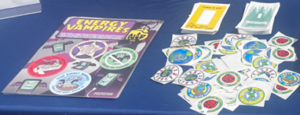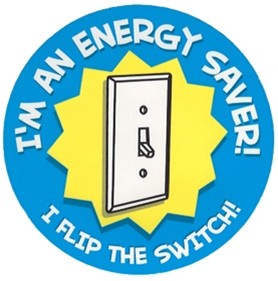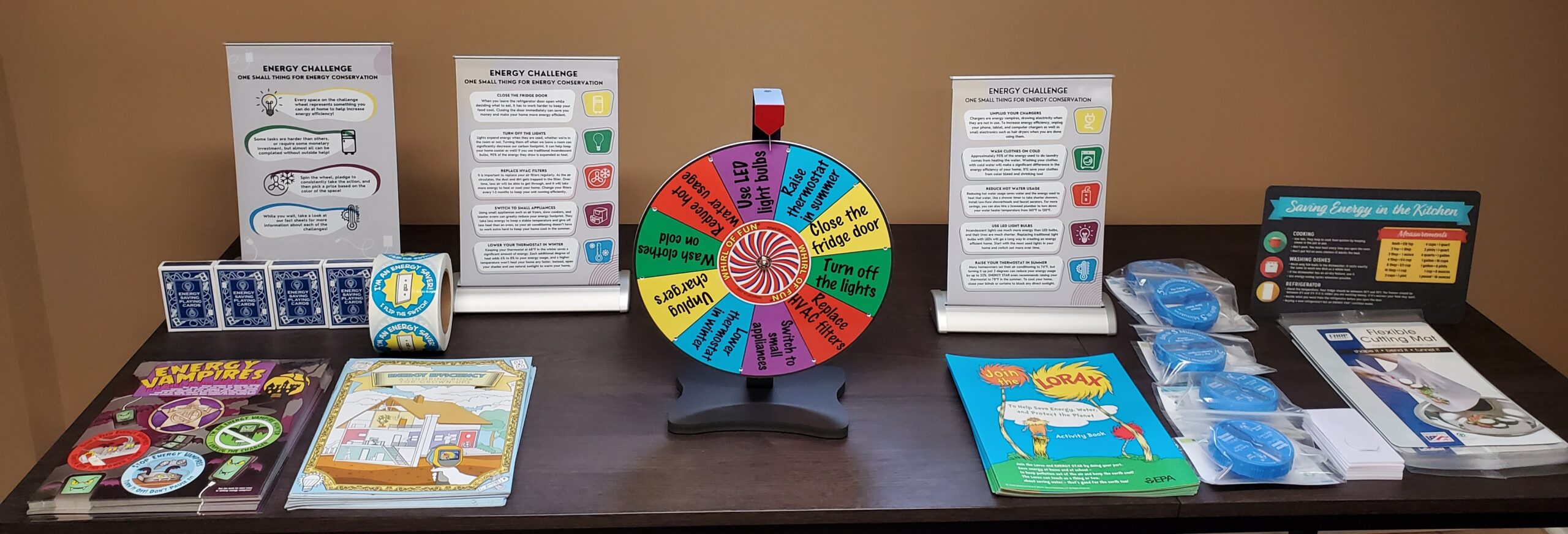
The Caucus created an energy efficiency challenge wheel. Municipalities may want to copy this spinning wheel idea for their energy efficiency education and outreach events.
Energy Efficiency Games
Looking for fun, interactive ways to engage your community around energy efficiency? The Caucus created two hands-on game options for ideas to use at upcoming events:
- Energy Efficiency Challenge Wheels- Four Wheels are available for Earth Day and other community gatherings. Click here for instructions.
- Energy Efficiency Toss Games- Two Games designed to spark conservation and learning. See below for instructions.
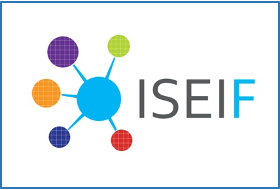 These games were made possible through the generous support of the Illinois Science & Energy Innovation Foundation (ISEIF).
These games were made possible through the generous support of the Illinois Science & Energy Innovation Foundation (ISEIF).
In addition, the Caucus, in partnership with the University of Illinois at Chicago Energy Resources Center (UIC ERC), has compiled a collection of low-cost energy efficiency activities organized by age group. These activities are perfect for Earth Day celebrations, sustainability fairs, or other community events.
Feel free to use any or all of these resources, and let us know how your event goes! Together we can make energy education engaging and accessible for all.
Challenge Wheel Game Instructions:
The Energy Efficiency Challenge Wheel is a fun way to help residents learn practical actions they can take home to save energy. Each space on the wheel represents an energy-saving task, organized by difficulty level:
- Yellow and Green: Easy tasks requiring minimal changes to daily routine.
- Blue and Purple: Actions that involve a small upfront cost or moderate adjustment to comfort or habits.
- Red: More advanced tasks that require research, efforts, or ongoing investment.
How to Play:
1.Spin the Wheel: The participant spins the challenge wheel.
2.Learn the Action: Share the details about the task they land on, or direct them to the infographic tabletop signs.
Example: If they land on “Close the fridge door”, the sign explains: “Leaving the refrigerator door open makes it work harder to keep food cool. Closing it promptly saves energy and money.”
3. Make a Pledge: Encourage participants to say, “I will commit to…” followed by the task.
4. Optional Spin Again: If they land on a red space and prefer an easier challenge, allow a second spin.
5. Pick a Prize: Participants choose a prize based on the difficulty level of their pledge.
For use this game, the Caucus provides an instruction sheet and infographic tabletop signs (Energy Challenge Introduction sign, Wheel Space Explanation 1, Wheel Space Explanation 2).
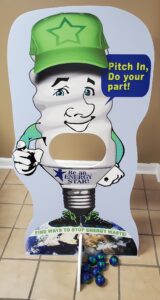
The energy efficiency toss game involves a participant throwing a bean bag into the toss game opening, while listening to facts on energy efficiency.
Energy Efficiency Toss Game Instructions
The Toss Game adds a playful twist to energy education. Participants toss bean bags through the game open while learning energy-saving facts.
How to Play:
- For each toss, share one energy efficiency fact from the provided instruction sheet.
- You can customize the game. For example, ask participants to pick a number (1-20) and read the corresponding fact.
- The Caucus provides source material so you can explore additional facts online.
Prizes:
- Residents who successfully toss a majority of bags into the opening, can win energy efficiency prizes.
- Alternatively, offer raffle entries for a chance to win a higher-value item.
Energy Efficiency Outreach Tools–Giveaways and Prizes:
- If you are interested in using the Challenge Wheel Game at outreach events, the link below will direct you to a dry erase wheel so you can recreate the Game:
- Energy Efficiency Coloring Book – This weatherization coloring book includes superheroes to teach kids about energy audits, sealing air leaks, and reducing energy usage. You may also choose to print off other energy-related coloring sheets as a tabling activity, which can be found on our Energy Efficiency Activities webpage.
- If you are looking for giveaways that are great fo
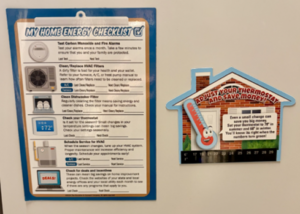 r adults, magnets are a great option. The Caucus gives away a House Heating and Cooling Magnet that gauges the temperature of your home. In addition, the Caucus also uses the Energy Checklist Magnet at events.
r adults, magnets are a great option. The Caucus gives away a House Heating and Cooling Magnet that gauges the temperature of your home. In addition, the Caucus also uses the Energy Checklist Magnet at events.
- If you are looking for a seasonal giveaway for events, the Caucus designed a graphic to stuff in colorful gloves to give to residents in the fall and winter months. to pair with the gloves, we also handed out handwarmers. See the links relevant to this giveaway
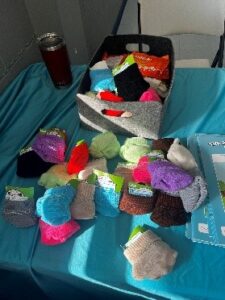 idea below:
idea below:
- “Need a Hand Savings Energy” Graphic for Gloves
- Pack of Colorful Gloves
- Pack of Handwarmers
- Stickers are an accessible prize to give away to kids of differing ages. The Caucus has given away energy saver stickers with a reminder to turn off the lights, non-specific environment related stickers, and Energy Vampire Specific Stickers sheets. These giveaways are fun for all ages, but they also educate kids about energy vampires, turning off the lights when leaving a room, and more. See the relevant links below:
- Energy efficiency playing cards cost a few dollars per pack, but they are a great way to keep residents thinking about energy efficiency long after your event–every time they play cards. The cards are available in English and Spanish.
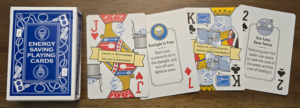
- Outlet and light switch gaskets are an inexpensive way to prevent a draft coming from an outlet or light switch and improve the energy efficiency of your home. To install them, one simply removes the outlet or light switch cover, places the gasket behind the cover, and reinstalls the cover. This giveaway is an inexpensive way to educate adults about energy efficiency:
- Helpful items for your table:
Other Energy Efficiency Activities
In addition to these games, the Caucus has other free and low-cost energy efficiency activity ideas for your municipal events at our Energy Efficiency Activities webpage.
Energy Goals
![]() The energy efficiency games and activities support local governments in achieving the energy goals of the Greenest Region Compact and the Climate Action Plan for the Chicago Region.
The energy efficiency games and activities support local governments in achieving the energy goals of the Greenest Region Compact and the Climate Action Plan for the Chicago Region.

